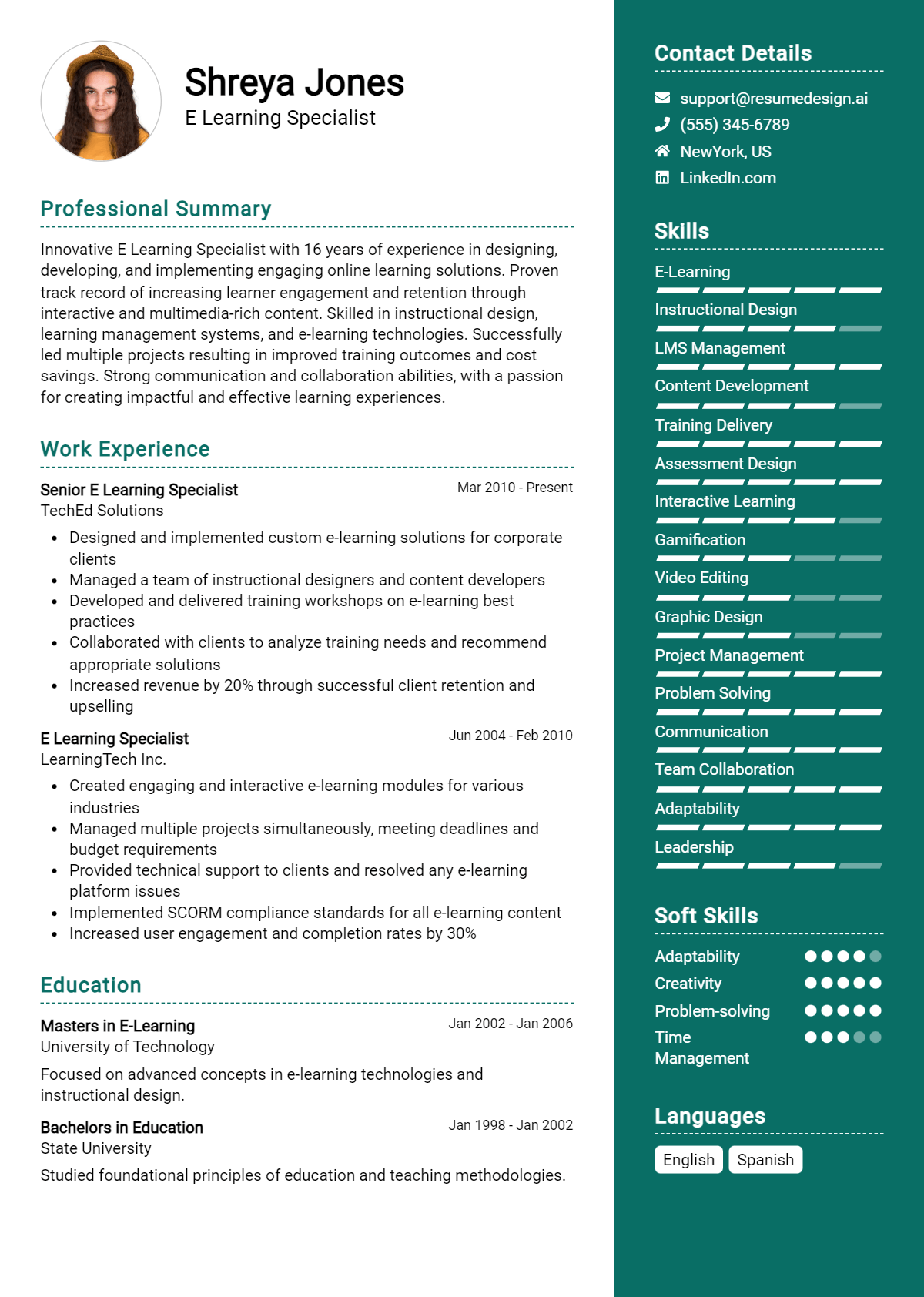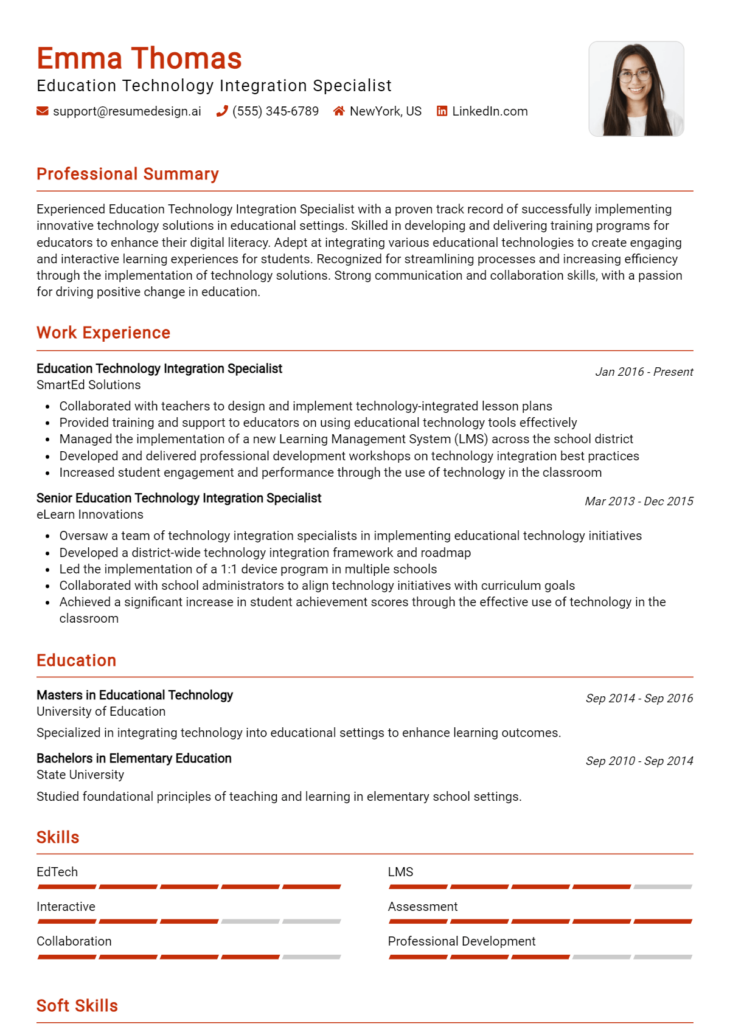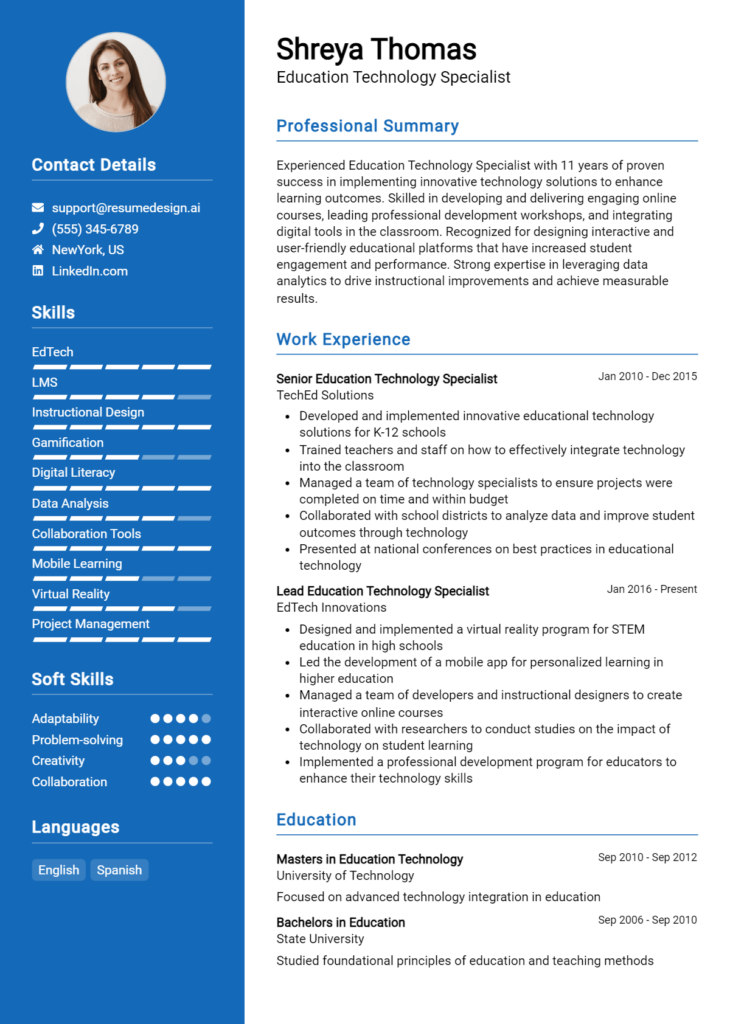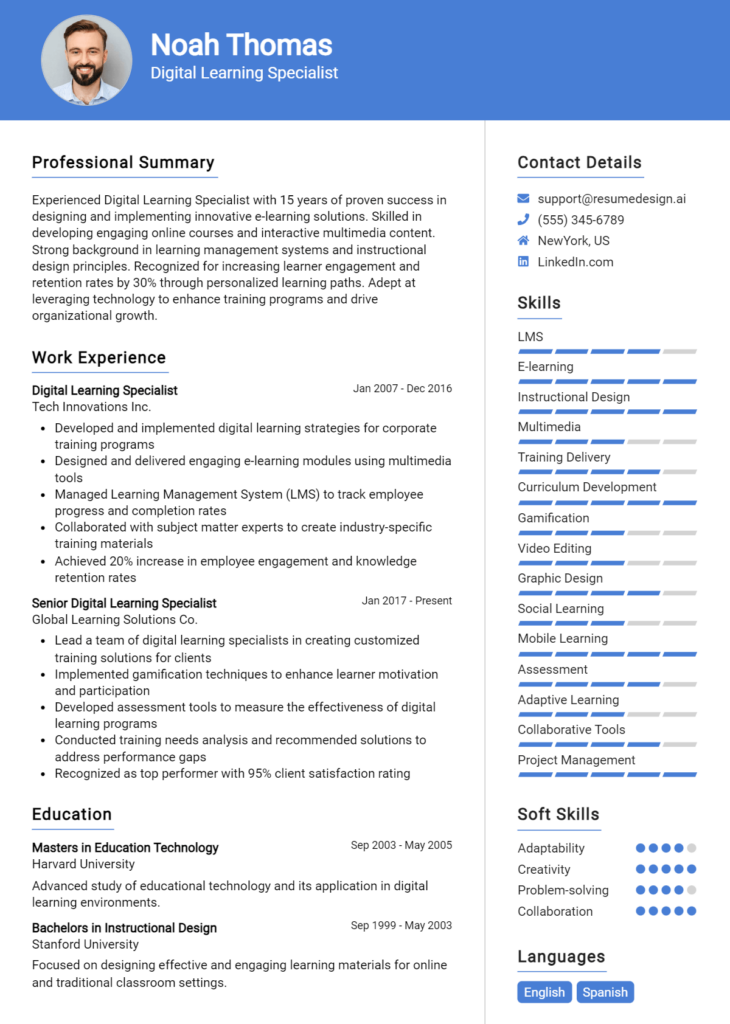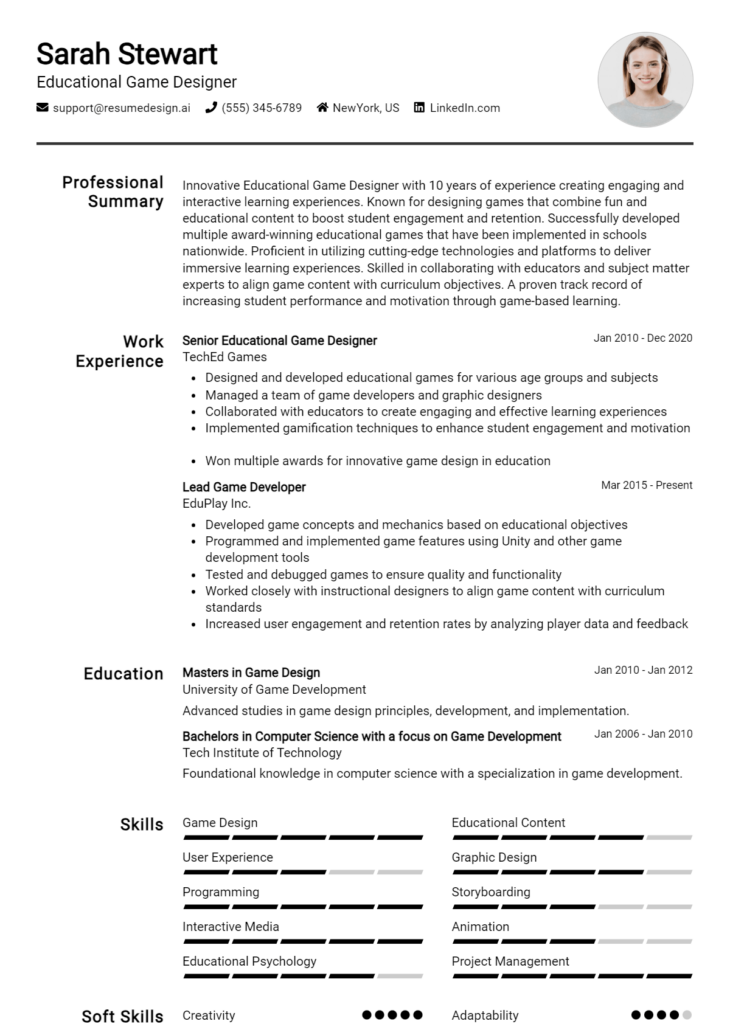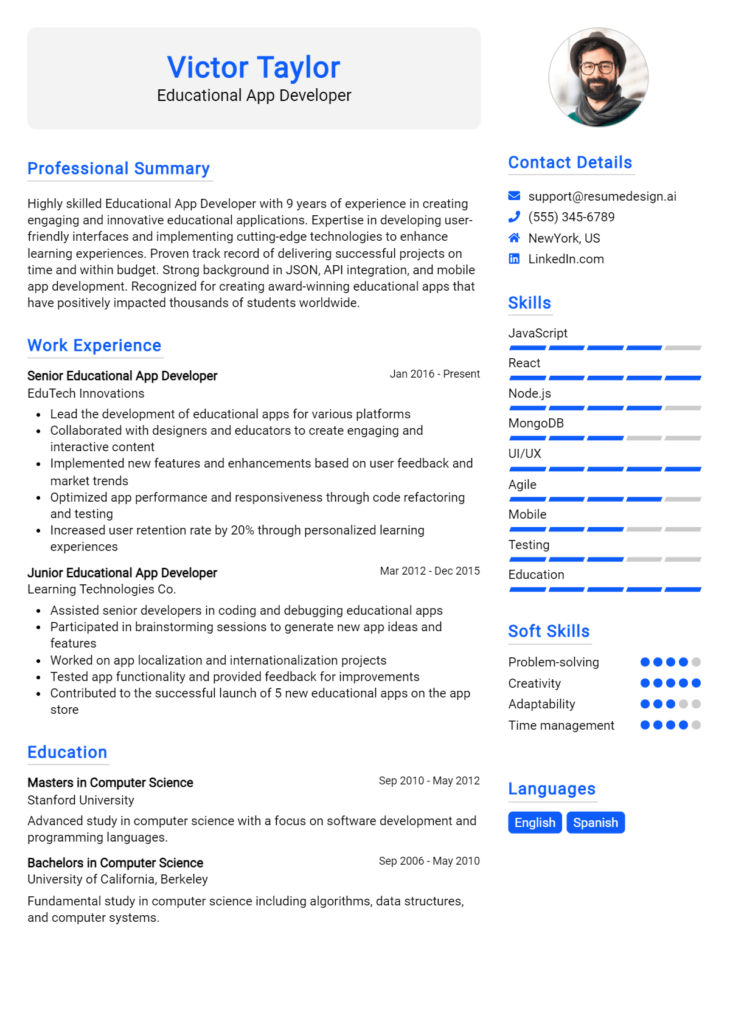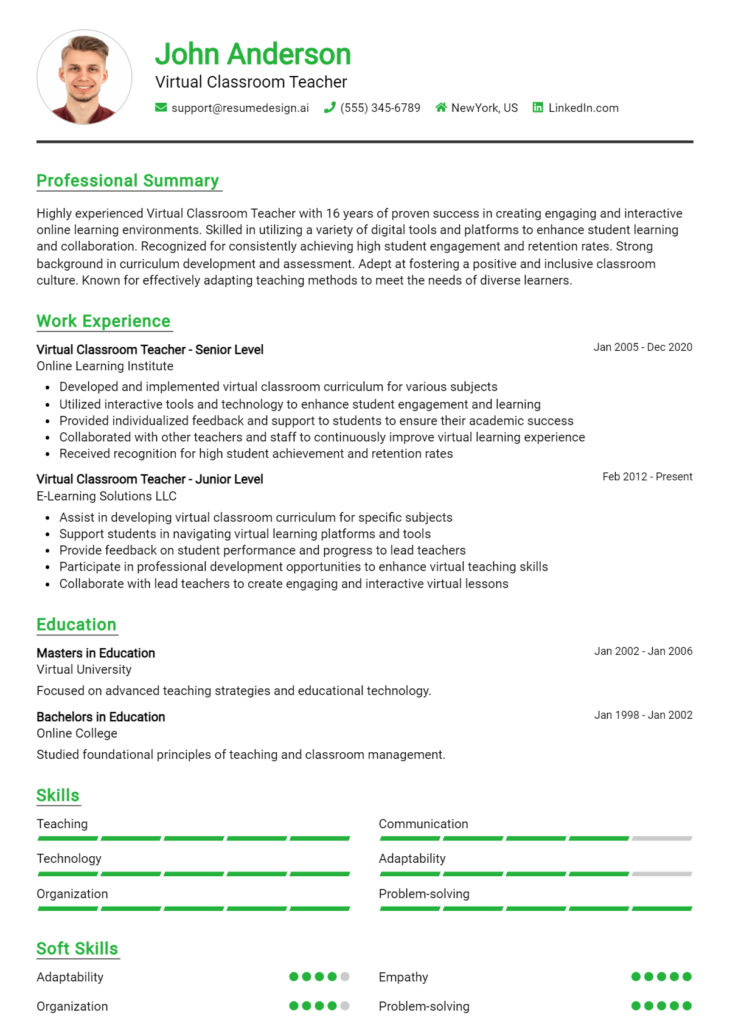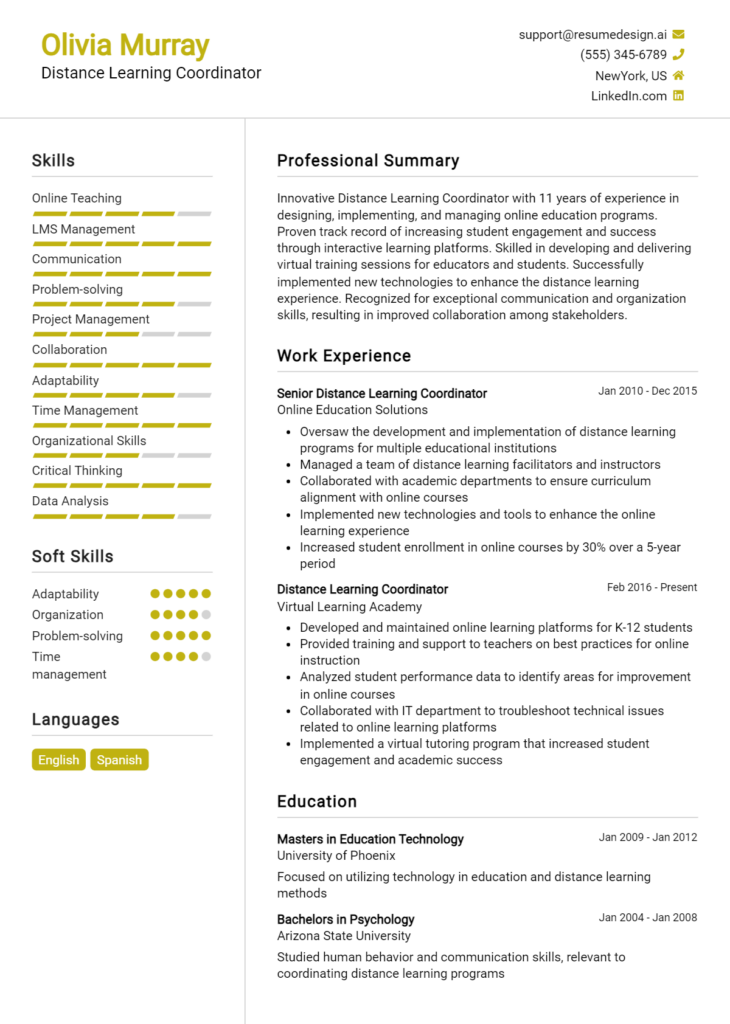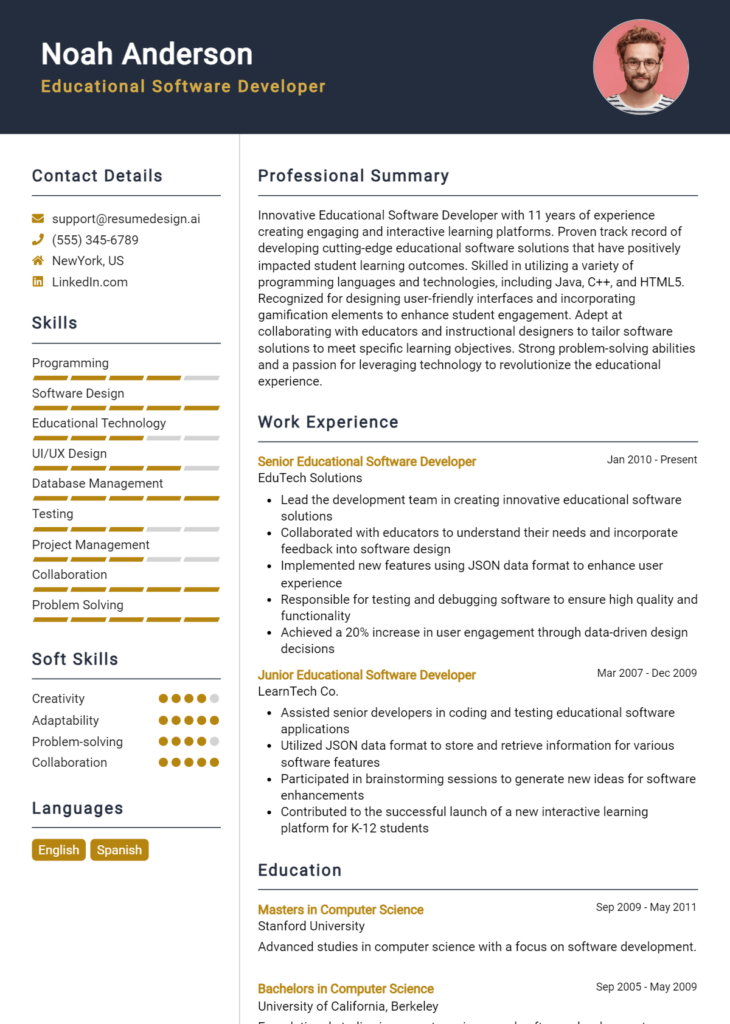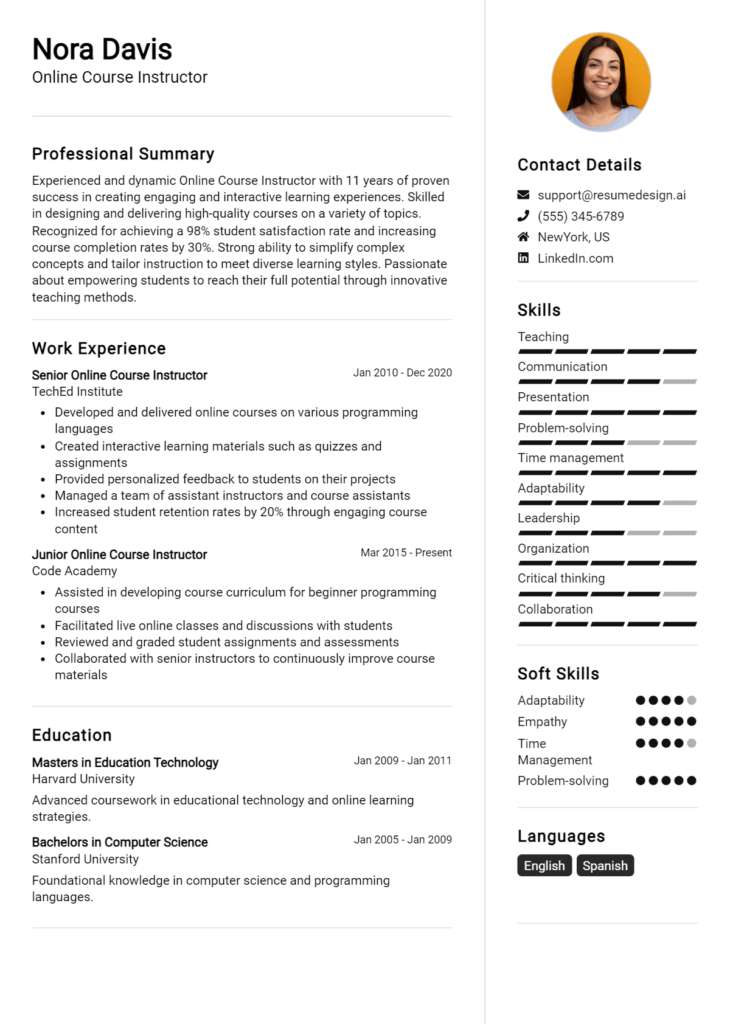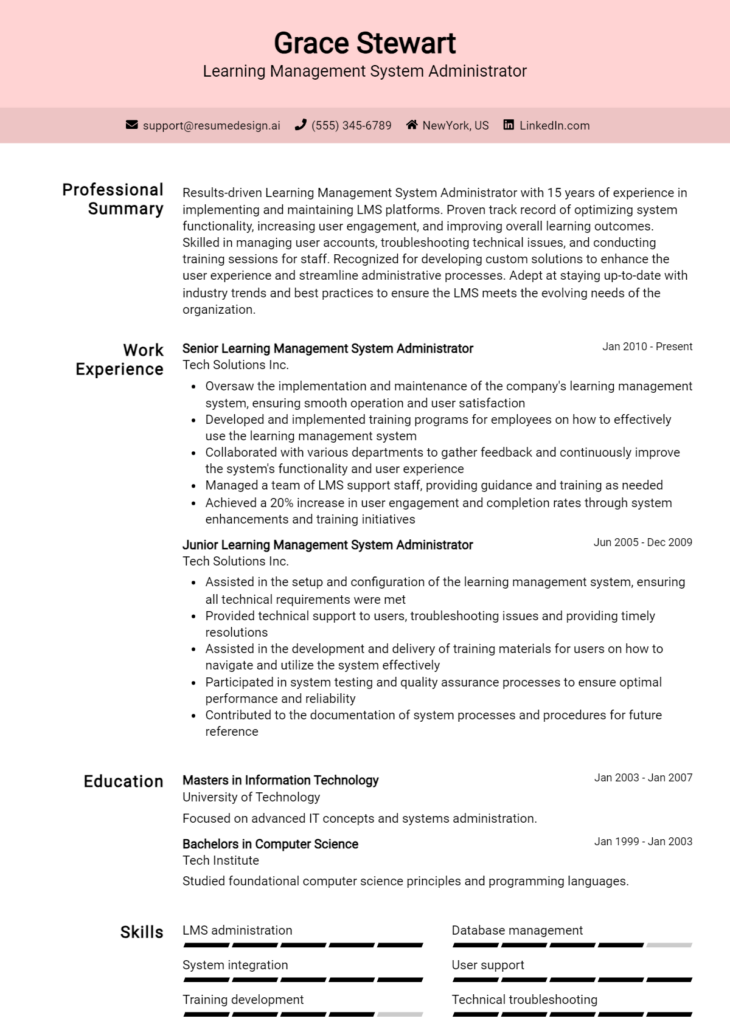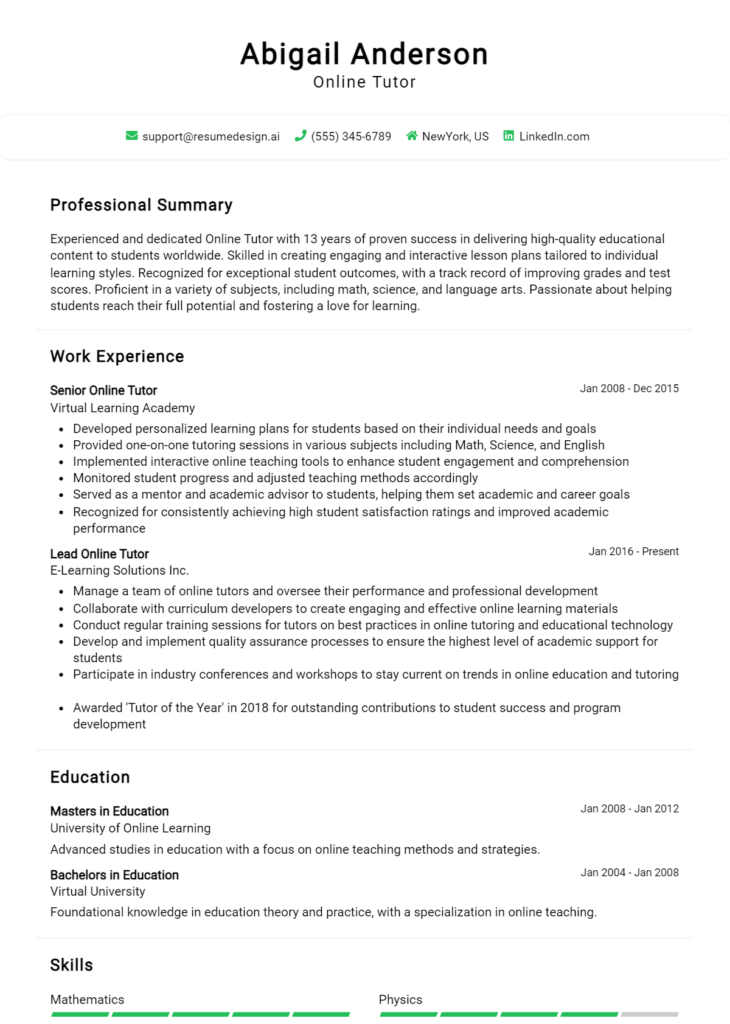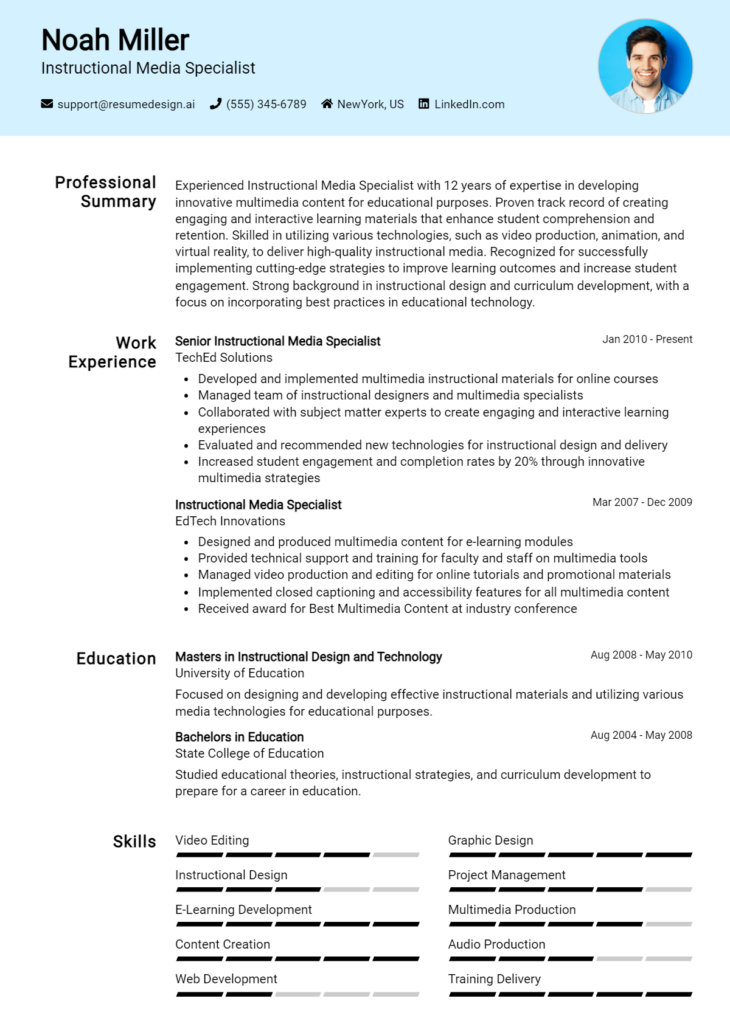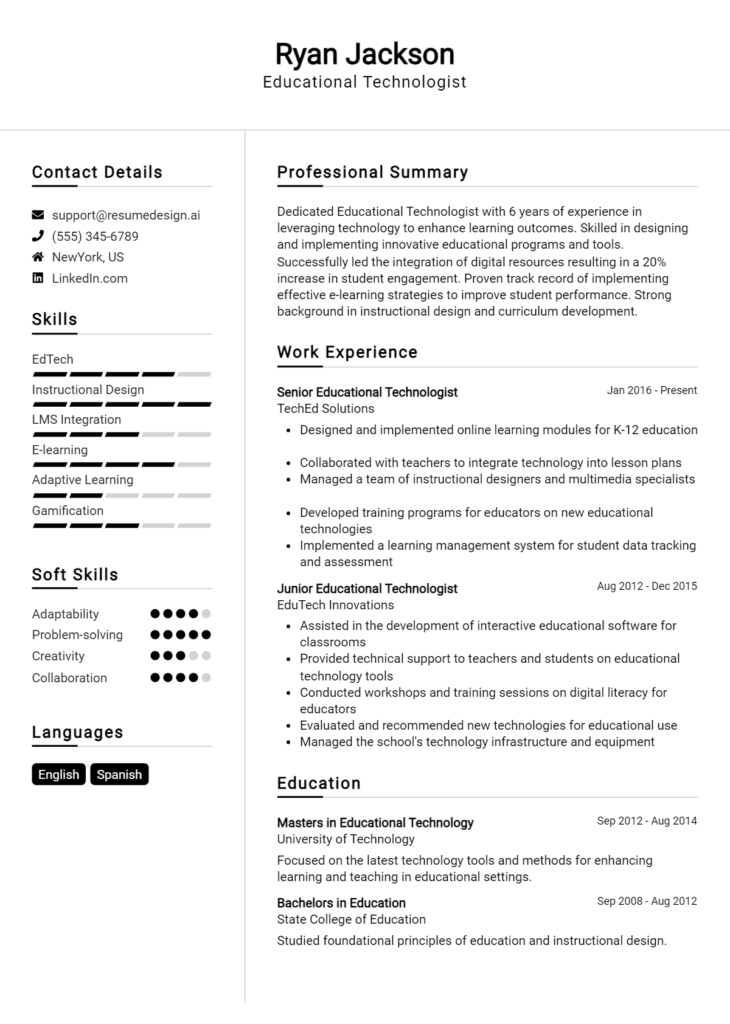E-Learning Specialist Core Responsibilities
An E-Learning Specialist plays a crucial role in bridging various departments, such as IT, education, and human resources, to develop effective online training programs. Key responsibilities include designing e-learning modules, assessing learner needs, and integrating technology into training initiatives. Essential skills encompass technical proficiency, operational planning, and strong problem-solving capabilities. These competencies not only enhance learner engagement but also align with the organization's goals. A well-structured resume can effectively showcase these qualifications, making candidates stand out.
Common Responsibilities Listed on E-Learning Specialist Resume
- Design and develop engaging e-learning courses and materials.
- Conduct needs assessments to identify training gaps.
- Collaborate with subject matter experts to ensure content accuracy.
- Implement and maintain Learning Management Systems (LMS).
- Evaluate the effectiveness of training programs through assessments.
- Utilize multimedia tools to enhance learning experiences.
- Provide technical support for e-learning platforms.
- Stay updated on e-learning trends and technologies.
- Facilitate instructor-led training sessions when necessary.
- Analyze learner feedback to improve course content.
- Develop instructional materials and guides for users.
- Ensure compliance with educational standards and regulations.
High-Level Resume Tips for E-Learning Specialist Professionals
In today’s competitive job market, a well-crafted resume is essential for E-Learning Specialist professionals looking to make a strong first impression on potential employers. Your resume often serves as the initial touchpoint between you and a hiring manager, and it needs to effectively showcase your unique skills, relevant experiences, and notable achievements in the field of e-learning. A compelling resume not only highlights your qualifications but also tells your professional story in a way that resonates with the specific needs of the employer. This guide will provide practical and actionable resume tips specifically tailored for E-Learning Specialist professionals, ensuring you stand out in a crowded applicant pool.
Top Resume Tips for E-Learning Specialist Professionals
- Tailor your resume for each job application by incorporating keywords and phrases from the job description.
- Highlight relevant experience in e-learning design, development, and implementation, focusing on specific projects you've worked on.
- Quantify your achievements with metrics, such as improved course completion rates or increased learner engagement percentages.
- Showcase your proficiency with e-learning authoring tools and learning management systems (LMS), such as Articulate Storyline or Moodle.
- Include a dedicated skills section that highlights both technical and soft skills relevant to e-learning, such as instructional design and communication.
- Provide examples of successful collaboration with subject matter experts and cross-functional teams to create effective learning solutions.
- Incorporate any certifications or professional development courses that enhance your qualifications in the e-learning field.
- Utilize a clean, professional format that makes it easy for hiring managers to quickly scan your resume for key information.
- Include a brief summary or objective statement at the top that encapsulates your career goals and unique value proposition as an E-Learning Specialist.
By implementing these tips, you can significantly increase your chances of landing a job in the E-Learning Specialist field. A resume that effectively highlights your skills, experiences, and achievements will not only capture the attention of hiring managers but also position you as a qualified and compelling candidate for the role.
Why Resume Headlines & Titles are Important for E-Learning Specialist
In the competitive field of e-learning, the role of an E-Learning Specialist is pivotal in designing and implementing effective online learning programs. A well-crafted resume headline or title serves as a powerful tool to capture the immediate attention of hiring managers. It acts as a succinct summary of a candidate's key qualifications and sets the tone for the rest of the resume. A strong headline should be concise, relevant, and directly related to the specific job being applied for, making it easier for recruiters to quickly assess a candidate's fit for the position.
Best Practices for Crafting Resume Headlines for E-Learning Specialist
- Make it concise: Use clear and straightforward language to convey your qualifications.
- Be role-specific: Tailor the headline to reflect the particular requirements of the E-Learning Specialist position.
- Highlight key skills: Include essential skills or certifications that make you a strong candidate.
- Use impactful language: Choose strong action verbs and adjectives that enhance your professional image.
- Avoid jargon: Keep the language accessible and avoid overly technical terms that may confuse hiring managers.
- Focus on accomplishments: If possible, incorporate measurable achievements to showcase your impact in previous roles.
- Keep it professional: Ensure the tone matches the industry standards for a formal resume.
- Consider keywords: Use relevant keywords from the job description to align your headline with what employers are seeking.
Example Resume Headlines for E-Learning Specialist
Strong Resume Headlines
"Innovative E-Learning Specialist with 5+ Years in Curriculum Development and Instructional Design"
“Results-Driven E-Learning Expert Specializing in Interactive Learning Solutions and User Engagement”
“Certified E-Learning Professional with Proven Track Record in Designing Scalable Online Training Programs”
Weak Resume Headlines
“E-Learning Specialist Looking for a Job”
“Experienced Professional in Online Learning”
The strong headlines are effective because they immediately communicate specific qualifications and achievements, making them appealing to hiring managers who are looking for candidates who can add value to their organization. In contrast, the weak headlines fail to impress because they are vague and lack the essential details that highlight the candidate's unique strengths or contributions. This lack of specificity makes it challenging for recruiters to recognize the candidate’s potential fit for the role.
Writing an Exceptional E-Learning Specialist Resume Summary
A well-crafted resume summary is crucial for an E-Learning Specialist, as it serves as the first impression to hiring managers. This concise overview highlights the candidate's key skills, relevant experience, and notable accomplishments, effectively capturing attention in a competitive job market. A strong summary not only provides a snapshot of the candidate’s qualifications but also demonstrates their suitability for the specific role, making it essential to tailor this section for each job application. The right summary can set the tone for the entire resume, encouraging hiring managers to explore further.
Best Practices for Writing a E-Learning Specialist Resume Summary
- Quantify achievements where possible to demonstrate impact.
- Focus on key skills relevant to the E-Learning Specialist role, such as instructional design, LMS proficiency, and content development.
- Tailor the summary to match the job description, using keywords that align with the employer's needs.
- Keep it concise, ideally within 3-5 sentences, to maintain the reader’s attention.
- Highlight specific accomplishments that showcase your expertise and contributions.
- Use action verbs to convey a sense of dynamism and initiative.
- Maintain a professional tone while infusing personality to stand out.
- Avoid jargon and overly technical language that may alienate the reader.
Example E-Learning Specialist Resume Summaries
Strong Resume Summaries
Dynamic E-Learning Specialist with over 5 years of experience in designing interactive online courses that increased learner engagement by 40%. Proficient in utilizing a variety of LMS platforms and e-learning authoring tools to create impactful educational content tailored to diverse learning styles.
Results-driven E-Learning Specialist with a proven track record of developing curriculum and training materials that improved course completion rates by 30%. Expertise in data analysis to assess learner performance and continuously enhance course effectiveness.
Innovative E-Learning Specialist with extensive experience in developing and implementing digital learning solutions for corporate training programs. Successfully led a team that delivered a 25% reduction in training costs while increasing employee satisfaction scores significantly.
Weak Resume Summaries
E-Learning Specialist with some experience in creating online courses. Looking for a new opportunity to grow in the field.
Dedicated professional passionate about education and technology. Seeking a position in e-learning to apply skills.
The strong resume summaries are effective because they are specific, quantifiable, and tailored to the E-Learning Specialist role, showcasing measurable achievements and relevant skills. In contrast, the weak summaries lack detail, fail to provide quantifiable outcomes, and come across as too generic, which does not capture the interest of hiring managers or demonstrate the candidate’s qualifications effectively.
Work Experience Section for E-Learning Specialist Resume
The work experience section of an E-Learning Specialist resume is pivotal in illustrating the candidate's proficiency in delivering educational content through digital platforms. This section not only highlights the technical skills acquired through hands-on experience but also showcases the ability to manage teams and projects effectively. By detailing past roles in a manner that quantifies achievements and aligns with industry standards, candidates can demonstrate their capability to produce high-quality e-learning products that meet the needs of various learners and organizations.
Best Practices for E-Learning Specialist Work Experience
- Focus on specific technical skills relevant to e-learning tools, such as LMS management, instructional design software, and multimedia production.
- Quantify your achievements by including metrics such as course completion rates, user engagement statistics, or revenue growth from training programs.
- Highlight leadership experience by detailing instances where you led a team or project, emphasizing communication and collaboration.
- Tailor your experience descriptions to align with industry standards and job requirements in the e-learning sector.
- Use action verbs to convey your role in projects, showcasing your initiative and contributions.
- Include relevant certifications or training that enhance your credibility as an E-Learning Specialist.
- Demonstrate adaptability by mentioning diverse learning environments or technologies you've worked with.
- Provide context for your experiences by explaining the challenges faced and the innovative solutions implemented.
Example Work Experiences for E-Learning Specialist
Strong Experiences
- Developed and launched a comprehensive online training program that increased employee engagement by 30% and reduced onboarding time by 25%.
- Led a cross-functional team of 10 in the design and implementation of a new Learning Management System, resulting in a 40% improvement in user satisfaction ratings.
- Created interactive e-learning modules that achieved an average completion rate of 95%, significantly exceeding industry benchmarks.
- Conducted data analysis on learner performance metrics, leading to a targeted curriculum update that enhanced course effectiveness by 20%.
Weak Experiences
- Worked on creating e-learning content for various projects.
- Participated in team meetings regarding training development.
- Assisted with the implementation of a Learning Management System.
- Helped in the evaluation of training programs.
The examples of strong experiences are considered effective because they provide clear, quantifiable outcomes and demonstrate the candidate's leadership and technical expertise in e-learning. They articulate specific contributions and the impact those contributions had, making the candidate's accomplishments tangible. In contrast, the weak experiences lack specificity and measurable results, making them less compelling and failing to convey the candidate's full potential or the value they can bring to a prospective employer.
Education and Certifications Section for E-Learning Specialist Resume
The education and certifications section of an E-Learning Specialist resume is crucial for showcasing a candidate's academic background and industry-related qualifications. This section not only highlights degrees and certifications but also reflects a commitment to continuous learning and professional development. By providing relevant coursework and specialized training, candidates can significantly enhance their credibility and demonstrate alignment with the specific requirements of the role. In a rapidly evolving field like e-learning, showing that one is well-versed in current trends and technologies can set a candidate apart from the competition.
Best Practices for E-Learning Specialist Education and Certifications
- Prioritize relevant degrees, such as Educational Technology, Instructional Design, or Adult Learning.
- Include industry-recognized certifications like Certified Professional in Learning and Performance (CPLP) or Adobe Captivate Certification.
- List relevant coursework that aligns with the skills required for the E-Learning Specialist role.
- Highlight any specialized training in e-learning tools and software, such as Articulate Storyline or Moodle.
- Keep the format clean and organized for easy readability, using bullet points and consistent styling.
- Indicate the dates of completion for certifications to show ongoing professional development.
- Consider including professional development workshops or seminars attended that relate to e-learning.
- Be concise but thorough, ensuring all listed qualifications are pertinent to the desired position.
Example Education and Certifications for E-Learning Specialist
Strong Examples
- M.S. in Instructional Design and Technology, University of XYZ, 2021
- Certified Professional in Learning and Performance (CPLP), Association for Talent Development, 2022
- Advanced Certificate in E-Learning Development, ABC Institute, 2020
- Relevant Coursework: Online Learning Strategies, Multimedia Design for Learning, Assessment in E-Learning
Weak Examples
- B.A. in History, University of ABC, 2010
- Certification in Basic Computer Skills, XYZ Training Center, 2015
- Diploma in Graphic Design, 2008 (not directly related to e-learning)
- Training in Microsoft Office Suite, 2019
The examples provided differentiate between strong and weak qualifications based on their relevance to the E-Learning Specialist role. Strong examples highlight degrees and certifications that directly pertain to e-learning, showcasing a candidate's expertise and dedication to the field. In contrast, weak examples include irrelevant or outdated qualifications that do not align with the current demands of the position, demonstrating a lack of focus on professional development in the relevant area.
Top Skills & Keywords for E-Learning Specialist Resume
As an E-Learning Specialist, showcasing a comprehensive set of skills on your resume is crucial for standing out in a competitive job market. Employers seek candidates who not only possess technical expertise but also demonstrate the ability to adapt, communicate, and collaborate effectively. A well-rounded skill set can significantly enhance your resume, showcasing your proficiency in creating engaging learning experiences and your capability to leverage technology in educational contexts. By emphasizing both hard and soft skills, you can demonstrate your readiness to contribute to innovative e-learning initiatives and support diverse learners in achieving their educational goals.
Top Hard & Soft Skills for E-Learning Specialist
Soft Skills
- Effective Communication
- Team Collaboration
- Adaptability
- Problem-Solving
- Creativity
- Time Management
- Attention to Detail
- Empathy
- Critical Thinking
- Interpersonal Skills
- Instructional Design Thinking
- Conflict Resolution
- Active Listening
- Cultural Awareness
- Flexibility
Hard Skills
- Learning Management Systems (LMS) Proficiency
- E-Learning Authoring Tools (e.g., Articulate Storyline, Adobe Captivate)
- Curriculum Development
- Multimedia Design
- HTML/CSS Knowledge
- Assessment Design and Evaluation
- Data Analysis and Reporting
- Project Management Software (e.g., Trello, Asana)
- Graphic Design (e.g., Adobe Creative Suite)
- Video Editing Software
- Online Assessment Tools
- SCORM Compliance
- User Experience (UX) Design
- Instructional Technology Integration
- Accessibility Standards (WCAG)
- Cloud-Based Collaboration Tools (e.g., Google Workspace)
- Virtual Classroom Management
- Mobile Learning Design
By integrating these essential skills into your resume and aligning them with your work experience, you position yourself as a capable and versatile E-Learning Specialist ready to meet the demands of modern educational environments.
Stand Out with a Winning E-Learning Specialist Cover Letter
As an experienced E-Learning Specialist with a passion for creating engaging and effective online learning experiences, I am excited to apply for the position at [Company Name]. With a strong background in instructional design and expertise in various e-learning technologies, I am confident in my ability to contribute to your team and enhance the educational impact of your online programs. My goal is to leverage my skills in curriculum development and multimedia production to create innovative learning solutions that meet diverse learner needs.
In my previous role at [Previous Company Name], I successfully designed and implemented a series of interactive courses that improved learner engagement by 30%. By utilizing tools such as Articulate Storyline and Adobe Captivate, I developed dynamic content that catered to different learning styles and preferences. I collaborated closely with subject matter experts to ensure that the material was not only informative but also relevant and applicable to real-world scenarios. My dedication to continuous improvement led me to seek feedback from learners and stakeholders, allowing me to refine course content and delivery methods effectively.
I am particularly drawn to [Company Name] because of its commitment to innovation in e-learning. I admire your approach to utilizing cutting-edge technology and pedagogical strategies to create impactful educational experiences. I am eager to bring my experience in Learning Management Systems (LMS) and data analytics to help optimize course offerings and learner outcomes. Additionally, I am passionate about fostering a collaborative learning environment and would welcome the opportunity to work alongside your talented team to drive the success of your e-learning initiatives.
Thank you for considering my application. I am excited about the possibility of contributing to [Company Name] and am looking forward to the opportunity to discuss how my skills and experiences align with your needs. I believe that together we can create transformative learning experiences that empower learners to achieve their goals.
Common Mistakes to Avoid in a E-Learning Specialist Resume
When crafting a resume for the role of an E-Learning Specialist, it's crucial to present your skills and experiences in the most effective way possible. However, many candidates make common mistakes that can hinder their chances of landing an interview. Understanding these pitfalls can help you create a compelling resume that stands out to hiring managers. Below are some frequent mistakes to avoid:
Lack of Specificity: Using vague language and general terms can make your skills seem less impressive. Instead, provide specific examples of your e-learning projects and outcomes.
Ignoring Keywords: Failing to incorporate relevant keywords from the job description can result in your resume being overlooked by applicant tracking systems (ATS). Tailor your resume to include industry-specific terminology.
Overloading with Technical Jargon: While it's important to showcase your technical skills, using too much jargon can alienate non-technical hiring managers. Aim for a balance that demonstrates expertise while remaining accessible.
Not Highlighting Results: Simply listing responsibilities without showcasing the impact of your work can diminish your achievements. Use metrics and outcomes to illustrate how you contributed to project success.
Poor Formatting: An unorganized or cluttered resume can be difficult to read and may frustrate hiring managers. Use clear headings, bullet points, and consistent formatting for a professional appearance.
Neglecting Soft Skills: E-Learning Specialists need strong communication and collaboration abilities. Failing to mention these soft skills can make your resume less appealing. Include examples of teamwork and interpersonal skills.
Using an Objective Statement: Many modern resumes benefit from a summary or profile section instead of a traditional objective statement. A summary can provide a quick overview of your skills and experiences that align with the role.
Omitting Professional Development: Not mentioning certifications, courses, or training relevant to e-learning can make your resume less competitive. Highlight continuous learning to show your commitment to the field.
Conclusion
As an E-Learning Specialist, you play a crucial role in designing and implementing effective online learning experiences. Your expertise not only enhances learner engagement but also ensures that educational content is accessible and impactful. Key elements of this role include:
- Curriculum Development: Crafting interactive and learner-centered curricula that meet the diverse needs of students.
- Technology Integration: Utilizing cutting-edge technology and e-learning tools to facilitate learning outcomes.
- Assessment and Evaluation: Developing assessment strategies to evaluate learner performance and program effectiveness.
- Collaboration: Working with educators, subject matter experts, and other stakeholders to create cohesive and comprehensive learning experiences.
- Continuous Improvement: Staying updated with the latest trends in e-learning and educational technology to refine and enhance your approach.
To maximize your potential as an E-Learning Specialist, it's essential to present your skills and experiences effectively. Take the time to review your resume and ensure it reflects your qualifications and achievements in this dynamic field.
Explore a variety of resources to help you create a standout resume, including resume templates, a user-friendly resume builder, curated resume examples, and tailored cover letter templates. Start enhancing your professional profile today!

